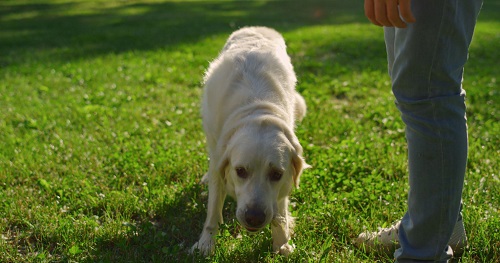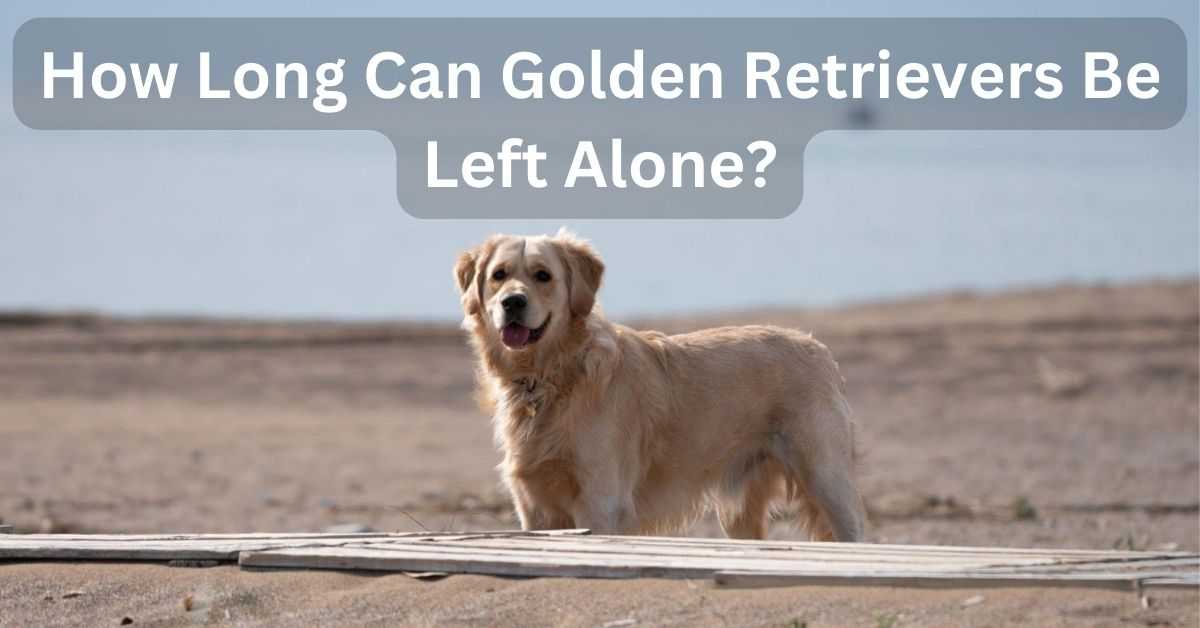Golden Retrievers are renowned for their friendly nature and loyalty, making them one of the most beloved dog breeds worldwide. Responsible pet owners need to consider their pets’ needs, especially when it comes to alone time. Let’s examine How Long Can Golden Retrievers Be Left Alone and the factors to consider and strategies to ensure your Golden Retriever copes well when left alone.
Understanding Golden Retrievers
Golden Retrievers have a kind and gentle temperament, making them great family pets. They are social animals that thrive on human interaction and bond deeply with their families.
Factors Affecting Alone Time
Age and Maturity
The age and maturity of your Golden Retriever play a significant role in how long they can be left alone. Puppies require more frequent care and attention compared to adult dogs.
Training and Socialization
Well-trained and adequately socialized Golden Retrievers tend to handle alone time better. Positive reinforcement training helps build their confidence and independence.
Health and Physical Needs
Consider your dog’s health and physical requirements. Younger and active Retrievers may need more exercise and potty breaks than older or less energetic ones.
Preparing for Alone Time
Puppy Preparations
If you have a puppy, start preparing them for alone time early. Gradually introduce short periods of separation to avoid separation anxiety.
Creating a Safe Environment
Designate a secure and comfortable area for your Golden Retriever to stay in while you’re away. Ensure they have access to water, toys, and a cosy resting spot.
Toys and Mental Stimulation
Provide interactive toys and puzzles to keep your dog mentally engaged during alone time. Mental stimulation is as crucial as physical exercise.
Leaving Golden Retrievers Alone
Gradual Separation Training
Practice leaving your dog for short periods initially and gradually increase the time. This method helps them adjust to being alone without feeling anxious.
Establishing a Routine
Set a consistent daily routine for your dog, including feeding times, playtime, and alone time. Dogs thrive on predictability.
Tips for a Stress-Free Departure
Keep departures calm and low-key to avoid triggering separation anxiety. Avoid prolonged goodbyes and remain relaxed.
Monitoring and Remote Solutions
Using Cameras and Technology
Consider using cameras to keep an eye on your Golden Retriever while you’re away. Some dogs find comfort in hearing their owner’s voice through technology.
Hiring Pet Sitters or Walkers
If your dog struggles with extended periods alone, hiring a pet sitter or dog walker can provide companionship and necessary breaks.
Signs of Separation Anxiety
Common Behaviors to Watch For
Destructive behaviour, excessive barking, and house soiling are common signs of separation anxiety. Recognizing these behaviours is vital for addressing the issue.

Coping Strategies for Anxiety
Help your Golden Retriever cope with separation anxiety by using calming methods, such as music, pheromone sprays, or anxiety wraps.
Exercise and Playtime
Importance of Physical Activity
Regular exercise is essential for Golden Retrievers to stay healthy and maintain good behaviour. Aim for daily walks and play sessions.
Engaging Activities for Alone Time
Leave interactive toys or treat puzzles to keep your dog engaged while you’re away. This can help reduce boredom and prevent destructive behaviour.
Mental Stimulation
Interactive Games and Puzzles
Engage your dog’s mind with interactive games and puzzles that challenge their problem-solving abilities. Mental exercise is as rewarding as physical activity.
Training Sessions During Alone Time
Incorporate short training sessions during alone time. This not only strengthens their skills but also provides positive reinforcement.
Social Interaction
Doggie Daycare and Playdates
Consider enrolling your Golden Retriever in doggie daycare or arranging playdates with other dogs. Social interaction is enriching for dogs.
Interaction with Other Pets
If you have other pets at home, their companionship can provide comfort and reduce feelings of loneliness.
Preparing Before Leaving
Feeding and Potty Time
Ensure your dog is well-fed and has an opportunity to relieve themselves before you leave. A comfortable and satisfied dog is more likely to rest peacefully.
Saying Goodbye Calmly and Briefly
Avoid emotional goodbyes, as they can heighten your dog’s anxiety. Leave calmly without drawing too much attention to the departure.
Returning Home
Greeting and Reassuring
When you return, greet your Golden Retriever warmly and offer reassurance. This positive interaction reinforces that being left alone is temporary.
Post-Alone Time Routines
After alone time, follow a routine to make your dog feel secure. Engage in playtime, walks, or training sessions to reinforce the bond.

Increasing Alone Time Gradually
Lengthening Periods Gradually
If you need to leave your dog for extended periods, do it gradually. Slowly increase the time they spend alone to prevent stress.
Monitoring Progress and Adjustments
Observe your dog’s behaviour and make adjustments as needed. Each dog is unique, and the timeline for comfort with alone time can vary.
Managing Special Situations
Golden Retrievers with Separation Anxiety
Some Golden Retrievers may suffer from severe separation anxiety. Consult a professional trainer or behaviourist for tailored solutions.
Dealing with Medical Conditions
If your Golden Retriever has medical conditions, consider their specific needs when planning alone time.
Conclusion
Golden Retrievers are affectionate companions that require thoughtful consideration when it comes to alone time. You can ensure a happy and well-adjusted furry friend by understanding their needs, providing mental and physical stimulation, and gradually introducing alone time.
FAQs
Leaving a Golden Retriever alone all day is not recommended, especially for extended periods. They need social interaction and mental stimulation.
Signs of separation anxiety may include excessive barking, destructive behaviour, and bathroom accidents when left alone.
Yes, if your Golden Retriever gets along well with other pets, their company can be comforting during alone time.
Consulting a professional dog trainer or behaviourist can help address and manage separation anxiety.
Providing interactive toys, puzzles, and training sessions can make alone time engaging and enjoyable for your Golden Retriever.
